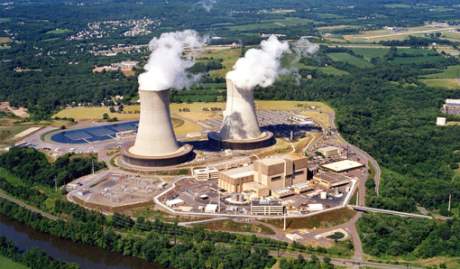US nuclear power plants are suffering under a challenging business environment, as Exelon CEO Chris Crane warned investors that the company could be forced to close nuclear units that are not profitable. Nevertheless, the case for nuclear in the USA remains strong.
 |
| Exelon's Limerick power plant enjoyed an average capacity factor of 96.3% in 2013 (Image: Exelon) |
Announcing Exelon's fourth quarter results, Crane noted that the company had achieved a strong operational performance through 2013 despite challenging market conditions, with the utility's nuclear plants achieving a capacity factor of over 94% and a record output.
Nevertheless, the USA's largest nuclear power generator is still at the mercies of the power market. Crane cited low prices and "bad energy policy" behind the failure of some of Exelon's nuclear units to operate profitably despite the company's "best ever" year in generation, and issued a stark warning: "If we do not see a path to sustainable profits we will be obligated to shut units down to avoid long-term losses." Crane suggested that the company expected its decision process on the issue to reach some "conclusion" by year end.
The answer, according to Crane, lies in changes to tax and energy policy to ensure "fair compensation" for the nuclear fleet. In particular, the company is calling for changes to the capacity market to recognise and compensate nuclear for its reliable and dependable baseload generation, illustrated by performance during recent extreme winter weather in many US states.
Crane's comments came in the same week that the US Department of Energy's assistant secretary for nuclear energy Pete Lyons told a nuclear energy conference hosted by Platts that the agency is reviewing the likely effects of nuclear plant closures on the country's ability to lower emissions of carbon dioxide.
Dominion's Kewaunee nuclear power plant has been widely cited as a prime example of a US nuclear plant forced to close solely due to economic conditions when it found itself unable to compete in a merchant market against cheap natural gas. The 574 MWe pressurized water reactor closed last May despite being licensed to operate to 2033. The past year has also seen a slow-down in planned uprate projects at US nuclear plants.
The US Nuclear Energy Institute (NEI) described Lyons' concerns as "valid", but pointed out to World Nuclear News that the fundamentals in the electricity sector continue to present a strong and compelling output for the value of nuclear in the USA. The potential for volatility in natural gas prices, plus nuclear's low-carbon characteristics, are two notable contributors to nuclear's value.
"Despite a still recovering economy, the US Energy Information Administration still forecasts a 28% increase in the demand for electricity through 2040. Diversity in an energy portfolio is as important as in a financial portfolio," the NEI's Mitchell Singer told World Nuclear News, noting that five new nuclear plants are in construction in the USA and will be in operation this decade. "If the US is going to meet its climate goals while taking care of electricity demand growth a strong contribution from nuclear power plants is imperative," he added.
Researched and written
by World Nuclear News






_97013.jpg)
_51413.jpg)






